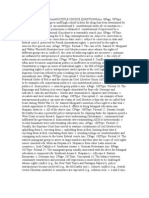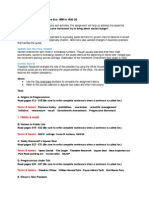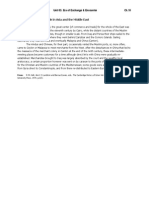Qz03b3 Unit03 - Era of Growth & Disunion
Qz03b3 Unit03 - Era of Growth & Disunion
Uploaded by
Anthony ValentinCopyright:
Available Formats
Qz03b3 Unit03 - Era of Growth & Disunion
Qz03b3 Unit03 - Era of Growth & Disunion
Uploaded by
Anthony ValentinOriginal Description:
Original Title
Copyright
Available Formats
Share this document
Did you find this document useful?
Is this content inappropriate?
Copyright:
Available Formats
Qz03b3 Unit03 - Era of Growth & Disunion
Qz03b3 Unit03 - Era of Growth & Disunion
Uploaded by
Anthony ValentinCopyright:
Available Formats
Qz03b3
Unit03_Era Of Growth & Disunion
Ch.10
1. This speech was one of Abraham Lincolns early (1838) and revealing efforts, while living in Springfield,
Ill. In it, he details his views on the role of law and the nations current political path.
a. 1st Inaugural. b. Cooper Union.
c. Young Mens Lyceum.
d. Lincoln-Douglas Debate.
2. For the above speech, the setting was
a. Political (Campaign). b. Legal (Court Room). c. Impromptu (Debate). d. Social Club.
3. The incident which set the foundation for this speech was
a. The election of Andrew Jackson.
b. Gruesome murder of a negro.
c. Economic Panic.
d. (Stump) Slavery debate
4. After careful analysis, which of these documents would you believe Abraham Lincoln gave greater
weight regarding the guiding principals of the United States?
a. Declaration of Independence.
b. Articles of Confederation.
c. Northwest Ordinance Act.
d. US Constitution.
5. In the speech given by John Brown before a Virginia Court in 1859, he was defending himself after
being arrested for
a. Instigating Bleeding Kansas
b. Leading a rampage against poor negro slaves.
c. raiding Harpers Ferry Arsenal.
d. establishing the Ku Klux Klan (KKK).
6. In this speech, John Brown
a. Pleads innocence
c. Doesnt offer a defense & pleads for mercy.
b. Admits guilt, but surprised by the charge/ sentence.
d. Threatens retribution against the court.
7. The charge of Treason was unusual because
a. Such a charge was rarely made prior to that point.
b. Treason was poorly defined prior to that point.
c. Treason convictions were often issued a light sentence prior to that point.
d. All are accurate.
8. The sentence issued to John Brown was
a. death by hanging.
b. death by electric chair.
c. probation & community service.
d. None are accurate
9. John Brown viewed slavery as a
a. Moral evil.
b. political problem.
10. John Brown
a. Supported the Kansas-Nebraska Act.
c. Was an Abolitionist.
c. a necessary social evil.
d. economic necessity
b. Owned slaves
d. Hoped to free slaves in the territories only.
You might also like
- An Outline of MLK Letter From Birmingham JailDocument1 pageAn Outline of MLK Letter From Birmingham JailTed StolzeNo ratings yet
- TriviaDocument15 pagesTriviaManuel ViscasillasNo ratings yet
- Abraham Lincoln Lesson Plan Busy TeacherDocument7 pagesAbraham Lincoln Lesson Plan Busy TeacherGardien DatgNo ratings yet
- English 12 Exam Semester 1Document6 pagesEnglish 12 Exam Semester 1J. Lindsey AlidorNo ratings yet
- John Brown Lesson PlanDocument7 pagesJohn Brown Lesson PlanRaidanSomaNo ratings yet
- ENGLISH Q BankDocument30 pagesENGLISH Q BankMosam PatelNo ratings yet
- The Civil Rights MovementDocument3 pagesThe Civil Rights MovementClara KissNo ratings yet
- Scottsboro Boys Teacher GuideDocument5 pagesScottsboro Boys Teacher GuideStephen FergusonNo ratings yet
- Qz03b Unit03: Era of Growth & DisunionDocument1 pageQz03b Unit03: Era of Growth & DisunionAnthony ValentinNo ratings yet
- ST Antebellum Test 1Document4 pagesST Antebellum Test 1api-639548952No ratings yet
- ID THE QUOTE (Answer Key at Bottom) : Charles Bronson - Timothy Mcveigh-Stephen BrodenDocument5 pagesID THE QUOTE (Answer Key at Bottom) : Charles Bronson - Timothy Mcveigh-Stephen BrodenKen PageNo ratings yet
- (1901) Herbert's Illustrated History of The Civil War in AmericaDocument424 pages(1901) Herbert's Illustrated History of The Civil War in AmericaHerbert Hillary Booker 2nd100% (2)
- Dawn of Desegregation: J. A. De Laine and Briggs v. ElliottFrom EverandDawn of Desegregation: J. A. De Laine and Briggs v. ElliottRating: 5 out of 5 stars5/5 (1)
- Abraham Lincoln PDFDocument4 pagesAbraham Lincoln PDFManzana AlarcónNo ratings yet
- Prisoner of Conscience: One Man's Crusade For Global Human and Religious Rights by Frank R. Wolf With Anne MorseDocument44 pagesPrisoner of Conscience: One Man's Crusade For Global Human and Religious Rights by Frank R. Wolf With Anne MorseZondervanNo ratings yet
- History Notes 1875 To Date From 012016Document7 pagesHistory Notes 1875 To Date From 012016Hunter McMainNo ratings yet
- There When We Needed Him: Wiley Austin Branton, Civil Rights WarriorFrom EverandThere When We Needed Him: Wiley Austin Branton, Civil Rights WarriorNo ratings yet
- Kahoot Questions P5 PDFDocument3 pagesKahoot Questions P5 PDFCarolina FonsecaNo ratings yet
- Scottsboro AnnotatedDocument13 pagesScottsboro Annotatedapi-119088866No ratings yet
- Martin-Luther-King StudentDocument3 pagesMartin-Luther-King StudentFayçal SerhaniNo ratings yet
- John Brown Research Paper ThesisDocument5 pagesJohn Brown Research Paper ThesisHelpWithPaperSingapore100% (1)
- Thesis Statement Abraham LincolnDocument4 pagesThesis Statement Abraham Lincolnmyelramosnorthlasvegas100% (3)
- Thesis Statement Abraham Lincoln AssassinationDocument8 pagesThesis Statement Abraham Lincoln Assassinationfc5g0qm1100% (2)
- Build Up To Civil WarDocument4 pagesBuild Up To Civil WarDhiom SriramNo ratings yet
- The Million-Dollar Man Who Helped Kill a President: George Washington Gayle and the Assassination of Abraham LincolnFrom EverandThe Million-Dollar Man Who Helped Kill a President: George Washington Gayle and the Assassination of Abraham LincolnNo ratings yet
- Moonlight: Abraham Lincoln and the Almanac TrialFrom EverandMoonlight: Abraham Lincoln and the Almanac TrialRating: 4 out of 5 stars4/5 (4)
- Annotated BibliographyDocument3 pagesAnnotated Bibliographyapi-238565565No ratings yet
- OS - L - DBQ - Civil - Rights - Movement - SourcesDocument15 pagesOS - L - DBQ - Civil - Rights - Movement - SourcesGabriel LantzNo ratings yet
- Thesis Abraham LincolnDocument8 pagesThesis Abraham Lincolnbsem160v100% (2)
- Lincoln Kennedy ConnectionDocument20 pagesLincoln Kennedy Connectiontraveller12No ratings yet
- Arthur Linton CorbinDocument30 pagesArthur Linton Corbinlij jone efremNo ratings yet
- Kansas Nebraska Act, Bleeding Kansas, and The Election of 1860Document4 pagesKansas Nebraska Act, Bleeding Kansas, and The Election of 1860lukasturner1207No ratings yet
- Informational Passages RC - Lincoln PDFDocument1 pageInformational Passages RC - Lincoln PDFliendhtnNo ratings yet
- African American: The Opposition Court Case My experience as a black man in America refusing to be identified as African AmericanFrom EverandAfrican American: The Opposition Court Case My experience as a black man in America refusing to be identified as African AmericanNo ratings yet
- Term Paper On Abraham LincolnDocument6 pagesTerm Paper On Abraham Lincolneldcahvkg100% (1)
- (David K. Fremon) The Jim Crow Laws and Racism in (Bokos-Z1)Document66 pages(David K. Fremon) The Jim Crow Laws and Racism in (Bokos-Z1)seanstacks2367% (3)
- John Brown Research Paper ThesisDocument4 pagesJohn Brown Research Paper Thesismkrferqhf100% (1)
- CHEM330 Answer Fall 2021 7Document4 pagesCHEM330 Answer Fall 2021 7thirsty1No ratings yet
- ChantelseipdraftDocument6 pagesChantelseipdraftapi-338304682No ratings yet
- Lincoln's Tragic Pragmatism: Lincoln, Douglas, and Moral ConflictFrom EverandLincoln's Tragic Pragmatism: Lincoln, Douglas, and Moral ConflictRating: 3.5 out of 5 stars3.5/5 (2)
- Martin Luther King: Uploaded by Sernani FayçalDocument3 pagesMartin Luther King: Uploaded by Sernani FayçalFayçal SerhaniNo ratings yet
- ENG Research Proposal Winter 2019 10Document5 pagesENG Research Proposal Winter 2019 10rodricardenashNo ratings yet
- S K 2 His-TestsDocument11 pagesS K 2 His-TestsSapa PynGNo ratings yet
- Bertrand Russell OutlineDocument3 pagesBertrand Russell Outlinecgh3_1415No ratings yet
- 18-19 Study GuideDocument6 pages18-19 Study Guideapi-236922848No ratings yet
- Thesis Statement Examples For Abraham LincolnDocument8 pagesThesis Statement Examples For Abraham Lincolnaliciastoddardprovo100% (1)
- The Souls of Black Folk: With "The Talented Tenth" and "The Souls of White Folk"From EverandThe Souls of Black Folk: With "The Talented Tenth" and "The Souls of White Folk"No ratings yet
- Useless Presidents QuestionsDocument7 pagesUseless Presidents QuestionsDavid FongNo ratings yet
- Genocide Research Paper Exp OutlineDocument3 pagesGenocide Research Paper Exp OutlineAidan Hudson (Otles06)No ratings yet
- Dissertation Abraham LincolnDocument7 pagesDissertation Abraham LincolnPaySomeoneToWriteYourPaperSavannah100% (1)
- Thesis Statement of Lincolns First Inaugural AddressDocument8 pagesThesis Statement of Lincolns First Inaugural Addressjuliepottsdenton100% (2)
- Introduction Research Paper Abraham LincolnDocument4 pagesIntroduction Research Paper Abraham Lincolnogisxnbnd100% (1)
- Unit 6 Citizenship ReadingDocument4 pagesUnit 6 Citizenship Readingtuokafonmon268No ratings yet
- Killing Lincoln ThesisDocument8 pagesKilling Lincoln Thesisnicolewilliamslittlerock100% (2)
- CHAPTER5GOVDocument8 pagesCHAPTER5GOVInactiveAccount100% (1)
- Download ebooks file Black Communists Speak on Scottsboro 9th Edition Walter T. Howard all chaptersDocument84 pagesDownload ebooks file Black Communists Speak on Scottsboro 9th Edition Walter T. Howard all chaptersakwayocary100% (3)
- Thesis Statement About Abraham Lincoln LifeDocument4 pagesThesis Statement About Abraham Lincoln Lifebkx89b3r100% (2)
- (1884) The Popular History of The Civil War (1861-1865)Document418 pages(1884) The Popular History of The Civil War (1861-1865)Herbert Hillary Booker 2nd67% (3)
- Pr01c2a - Development of HinduismDocument8 pagesPr01c2a - Development of HinduismAnthony ValentinNo ratings yet
- Pd10 - Qz09 Foreign PolicyDocument5 pagesPd10 - Qz09 Foreign PolicyAnthony ValentinNo ratings yet
- Pd10 - Grp04-Pr09 Economics 1968-PresentDocument16 pagesPd10 - Grp04-Pr09 Economics 1968-PresentAnthony ValentinNo ratings yet
- Pr03c - Ch12 - Khmer EmpireDocument10 pagesPr03c - Ch12 - Khmer EmpireAnthony ValentinNo ratings yet
- Pd09 - Pr09-Economics 1968 - Present DayDocument12 pagesPd09 - Pr09-Economics 1968 - Present DayAnthony ValentinNo ratings yet
- Pr01b3 - Indus River ValleyDocument6 pagesPr01b3 - Indus River ValleyAnthony ValentinNo ratings yet
- Pd09 - Grp04-Pr09 Foreign Policy 1968-PresentDocument29 pagesPd09 - Grp04-Pr09 Foreign Policy 1968-PresentAnthony ValentinNo ratings yet
- Pd10 - Grp02-Rise of ConservatismDocument27 pagesPd10 - Grp02-Rise of ConservatismAnthony ValentinNo ratings yet
- Pr03c - Ch12: Early & Feudal JapanDocument27 pagesPr03c - Ch12: Early & Feudal JapanAnthony ValentinNo ratings yet
- A05a - Ch17-Progressive EraDocument2 pagesA05a - Ch17-Progressive EraAnthony ValentinNo ratings yet
- 03c - Rdg-California RebelDocument1 page03c - Rdg-California RebelAnthony ValentinNo ratings yet
- 03b - Rdg-A Question of CourageDocument1 page03b - Rdg-A Question of CourageAnthony ValentinNo ratings yet
- Pd09 - Grp05-Civil Rights - KeyDocument10 pagesPd09 - Grp05-Civil Rights - KeyAnthony ValentinNo ratings yet
- 03a2 Presentation-Islam ExpandsDocument9 pages03a2 Presentation-Islam ExpandsAnthony ValentinNo ratings yet
- 03c - Puzzle - The Civil War BeginsDocument2 pages03c - Puzzle - The Civil War BeginsAnthony ValentinNo ratings yet
- 03a - Presentation-Rise of IslamDocument14 pages03a - Presentation-Rise of IslamAnthony ValentinNo ratings yet
- 03a2 Rdg-MuslimTradeMachineDocument1 page03a2 Rdg-MuslimTradeMachineAnthony ValentinNo ratings yet
- 02c - RDG - Chinese CalligraphyDocument5 pages02c - RDG - Chinese CalligraphyAnthony ValentinNo ratings yet
- Qz03b Unit03: Era of Growth & DisunionDocument1 pageQz03b Unit03: Era of Growth & DisunionAnthony ValentinNo ratings yet













































































